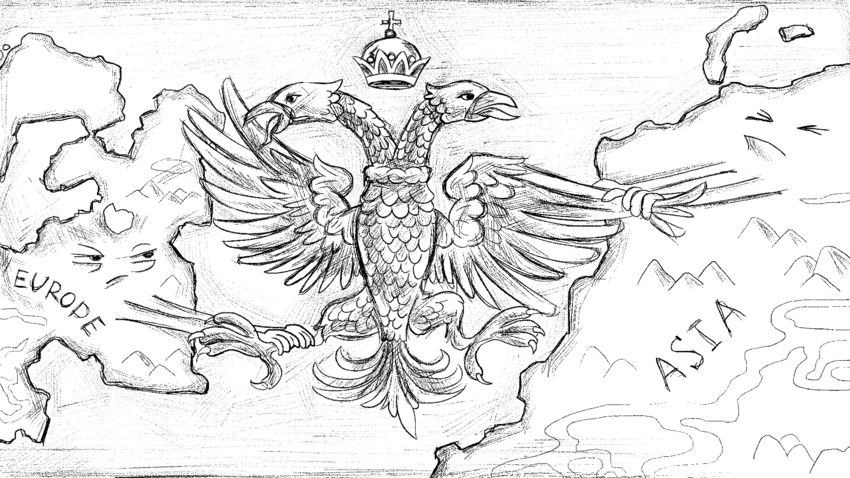
Even Russia's coat of arms reflects its dual nature: one head of the eagle is facing Europe and the other looks to Asia
Natalya NosovaRussia certainly doesn’t lack monuments marking the border between Europe and Asia. There are around 50 of them and some can be misleading. For example, a famous “Europe – Asia” obelisk in Orenburg (1400 km east of Moscow) was built on the idea that the Ural River (which Orenburg straddles) separates the two parts of the world. This train of thought is now considered wrong.
Traditionally, most scientists now suppose that the eastern side of the Ural Mountains roughly set the border between Europe and Asia in Russia. Anyway, it’s easy to define the correlation between Russia’s European and Asian territories: About 23 to 77 percent respectively. What’s much harder to find out is whether Russia
Although the biggest country in the world predominantly lies beyond the Ural Mountains its population is concentrated in Europe to a great extent. Around 75 percent of Russians live in the European part of the country with vast spaces of Siberia and the Far East still generally underpopulated due to the harsh climate.
As Vladimir Kolosov, president of the International Geographical Union, told Russia Beyond, “the population in Russia there [in its Asian part] stands at two people per square kilometer.” The two biggest cities (Moscow and St. Petersburg) also are in Europe, as well as all federal authorities so many
The main question concerning Russia’s identity in relation to the outside world could be formulated as “Is Russia a European country or not?” The issue sparked serious debate in the 19th century when the two most influential groups among Russian intellectuals were the Slavophiles and the Westernizers.
Back then, the Slavophiles believed that Russia should have relied on its unique heritage (traditions, Orthodox Christianity, rural life) while the Westernizers supported the idea of European-style modernization and individualism. Put on pause by the Russian revolutions of 1917 when the radical Socialists came to power, the dispute between Westernizers and their opponents still continues. What are the key arguments?
Those opposing the idea that Russia belongs to the Western world usually emphasize that the Russians throughout history have been living “at the crossroads” of civilizations and have therefore embraced cultural values from both Europe and Asia.
As Lev Gumilev, a Russian historian and one of the most authoritative Eurasianists (those who consider Russia a Eurasian, Western-Eastern country), said, “Russia is a distinctive country which unites elements from West and East.”
Moreover, the troubled history of Russia’s controversial relations with European countries and the West
On the other hand, in the very same
For instance, Alexander Baunov, a Russian journalist and the editor-in-chief for Carnegie.ru, wrote in his 2014 article that both Easterners and Westerners consider Russia closer to the global West, at least in terms of culture. “Our differences from any Western country are very significant but they are not much more than differences between Finland and Portugal, Hungary and Ireland, Cyprus and Poland,” Baunov wrote.
This article is part of the "Why Russia…?" series in which RBTH answers popular questions about Russia.
If using any of Russia Beyond's content, partly or in full, always provide an active hyperlink to the original material.
Subscribe
to our newsletter!
Get the week's best stories straight to your inbox